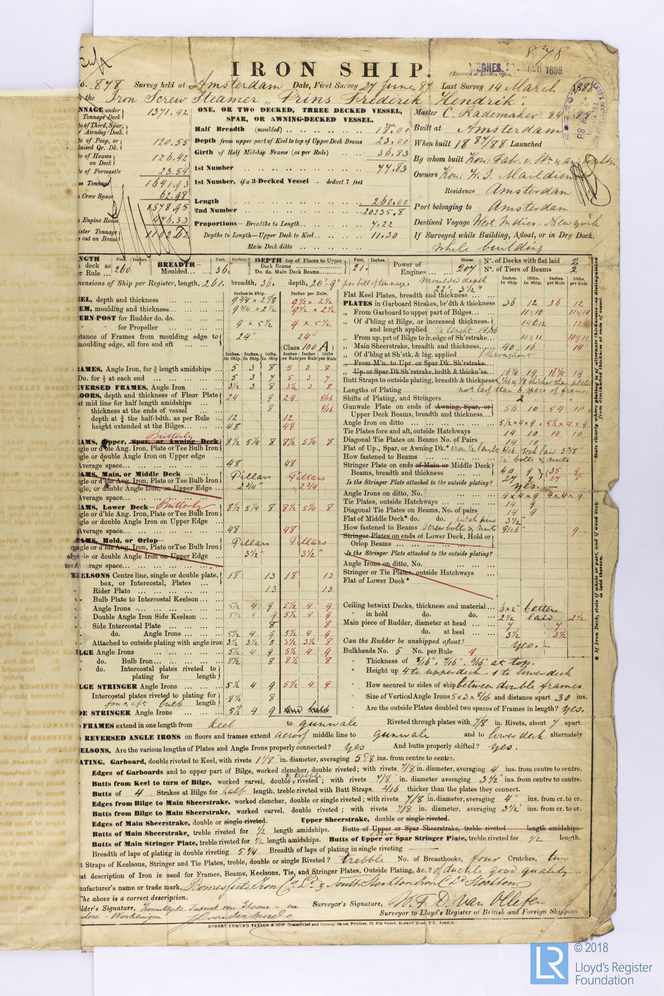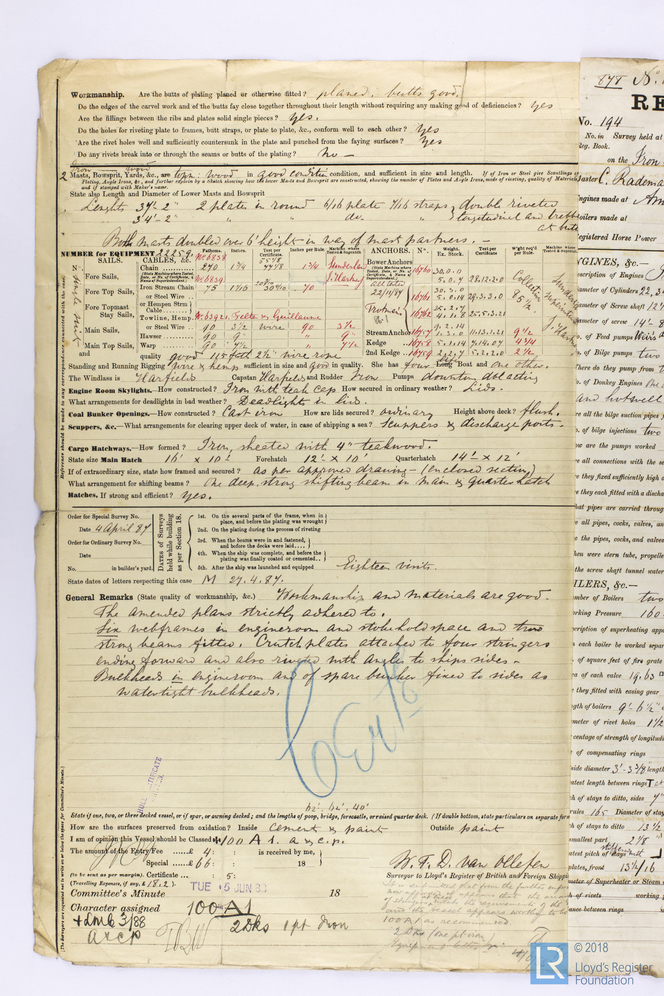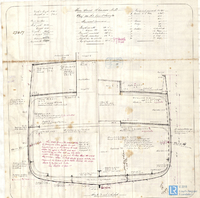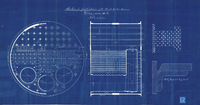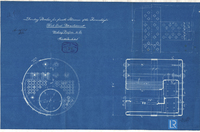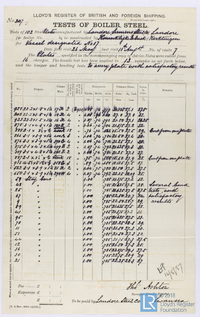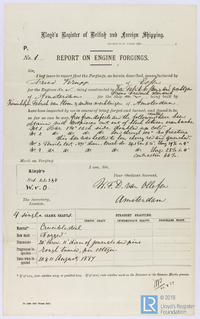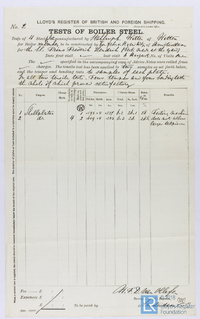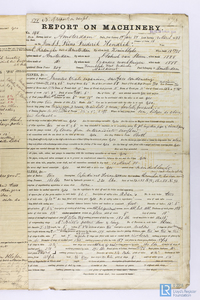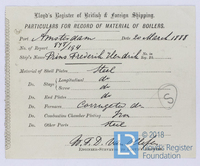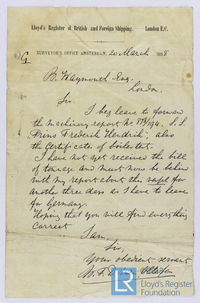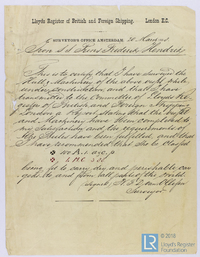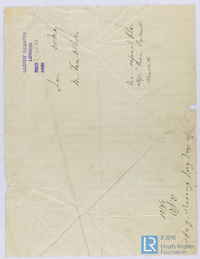- Related documents Related
- Full details Details
- Report document? Report?
Use the data export button to extract customised data sets from the Ship Plan and Survey Report Collection. Available in TSV and CSV formats.
Date recorded as the time of writing.
14/03/1888
The year in which a vessel’s construction is completed.
1888
The port or place in which the vessel’s construction took place, at the time of writing.
Amsterdam
Abbreviations of the names of ports with Lloyd’s Register survey offices.
Ams
Official administrative title (often printed) of a record used by Lloyd’s Register or external organisations.
Iron Ship
The listed port to which a given vessel belongs.
Amsterdam
The date of first visit by a surveyor.
27/06/1887
The individual and/or organisation listed
Koninklijke West Indische Maildienst
Name of the individual/entity/organisation responsible for authoring the record
W F D van Ollefen
Name of surveyor.
Willem F D van Ollefen
Classification symbol assigned to a vessel by Lloyd’s Register’s Classing Committee denoting the quality of construction and maintenance.
100A1 +LMC 3.88
The name of the port/place from which a vessel’s voyage originated.
Amsterdam
A vessel’s means of propulsion.
Steam
The method of ship construction used.
Riveted
A ship’s total internal volume in ‘register tons’ (replaced by gross tonnage post 1982).
1642
Tonnage derived by deducting from the gross register tonnage the capacity that in unavailable for cargo, e.g. machinery space, fuel, crew accommodation etc.
1103
Location of construction for a vessel’s engines.
Amsterdam
Date in which construction of a vessel’s engines were completed.
1888
Confirmation as to whether the vessel was equipped with refrigeration machinery to aid in the transport of frozen or chilled cargo/goods.
No
Does the vessel possess an auxiliary power source?
No
Is electric lighting fitted to the vessel?
No
207
Prescribed by flag/registration authorities, and usually excludes a small part of the stern. It is measured from the foreside of the stern at the extreme top to the afterside of the stern post.
261
Measurement from the underside of the upper deck on the centre line to the upper side of the bottom plating.
20.9
Name of ship as recorded on the record
Prins Frederik Hendrik
The individual and/or organisation listed as having been responsible for constructing the vessel. This can/may be the same as the owner and/or manager.
Koninklijke Fabriek van Stoom
The country in which the vessel’s construction took place, at the time of writing.
The Netherlands
Unique internal numbers used for identifying, referring and retrieving a specific survey report.
878
The country (flag) that a vessel is registered to, at the time of writing.
The Netherlands
Records that constitute Lloyd’s Register’s first official encounters with a specific vessel, e.g. a survey report.
Y
The date of last visit by a surveyor.
14/03/1888
An officially licensed mariner (post 1850) holding ultimate command and responsibility for a vessel.
C Rademaker
Location where the document is written.
Amsterdam
Location where a vessel’s survey was undertaken.
Amsterdam
Date of the meeting of the Classing Committee.
05/06/1888
The name of the port/place of destination given.
West Indies; New York
Predominant material(s) utilised in a vessel’s construction.
Iron
Is the steamer assisted by sail?
No
A ship’s total internal capacity of a ship measured in register tons from the top of the floors to the tonnage deck.
1371
Description/specifications listed of the vessel’s engines and machinery. (The engines/machinery may have been surveyed separately before being assigned to a vessel).
Inverted triple expansion, surface condensing
The country, at the time of writing, where a vessel’s engines were constructed.
The Netherlands
Koninklijke Fabriek Van Stoom En Andere Werktuigen
Is machinery fitted at the aft of the vessel?
No
Generally a smaller additional auxiliary boiler (often used while the vessel is at port).
No
Name of the Proving House responsible for the public testing and certification of a vessel’s anchors and/or chain cables.
No
Moulded dimensions breadth- Also referred to as moulded beam. The distance from the inside of the starboard side plating to the inside of the port side plating.
36
Also referred to as extreme breadth. The distance from the extreme starboard side to the extreme port side.
36
Physical extent of a record.
1
Report an issue with this document
Have you noticed missing or incorrect data or images for this document?
Please let us know and we will rectify the issue as soon as possible.

